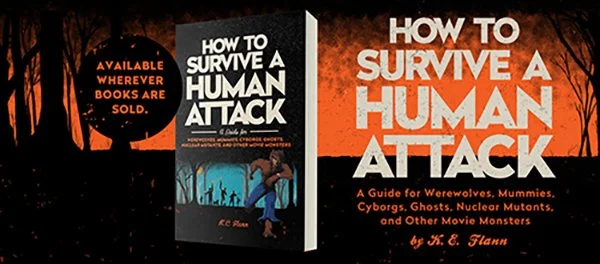Advice to Sink Teeth Into: Kathy Flann
An author and creative writing lecturer dispenses wisdom for aspiring writers and the monsters who inspire them.
As new parents, Kathy Flann ’95 and her husband cherished their evenings on the couch binge-watching shows, their tastes mutually running to science-fiction, horror and all things “nerdy.”
On most nights, their viewing material was mutually enjoyed. But when it came to the critically-acclaimed AMC show “The Walking Dead,” Flann preferred to work on her own projects in another room. But the sounds—and the constant screaming—became a distraction. Then an inspiration.
“I was supposed to be writing an essay, but I was just listening all the screaming and realized… they’re terrible at this,” said Flann from her home in Baltimore, Md. “These zombies are really bad, and somebody should help them—they’re getting slaughtered! I suddenly was writing what was like an advice piece for these zombies who were doing such a bad job holding their own.”
That advice column for zombie survival expanded to include more monsters, each with their own unique set of problems, in Flann’s latest book “How to Survive A Human Attack: A Guide for Werewolves, Mummies, Cyborgs, Ghosts, Nuclear Mutants, and Other Movie Monsters.”
A creative writing lecturer at Johns Hopkins University, as well as prolific short-story author, Flann uses her lifelong fascination with movie monsters to offer compelling solutions to their supernatural plights.
One of her earliest entries to the book, titled “The Compendium of Human Repellents,” lists objects like fangs, exposed intestines and “adding them to a mass email list” as useful items for surviving an encounter with monster-hating humans.
Ultimately, “How to Survive A Human Attack” is as much an indictment of human behavior as it is a survival guide. Whether an attachment to material items makes them prime for a quick snack, or their self-assured mental supremacy leads to miscalculation, Flann has a way of exposing the absurdity of modern life the moment a monster has us cornered.
Occasionally, she also finds the beauty within the beasts. “Zombies have a capacity for appreciation of beauty that humans do not,” she writes while discussing what happens to a zombie’s head once it has been severed from the body and starts rolling down a hill.
A Virginia native, Flann grew up close to Washington D.C. and earned her bachelor’s degree from Virginia Tech. An interest in Southern literature at the time fueled her decision to attend Auburn for her master’s degree, and while she was committed to creative writing as a profession, it wasn’t until she came to the Plains that she found her path forward.
While pursuing her Master’s in English with a creative writing concentration, Flann benefited from a broad exposure to diverse authors and genres. Her grasp of the written word was honed under literature professor like Bert Hitchcock and creative writing professor Judy Troy, and the advice she gained as a student she applied not only to her own career, but in teaching lessons to her students.
“[My writing career] absolutely began in earnest at Auburn. Under those professors, there was that start, and the first two publications I had were the two stories for my thesis.”
One of those short stories, titled “Black Lagoon” and later published in the journal Crazy Horse, began in Troy’s classroom as an exploration of grief between two teenagers who go to see “The Creature From the Black Lagoon.” That’s when Troy told her to re-watch the original movie.
“I had seen it as a kid, but when I watched it again, she was so right—there’s so many themes in this movie that really I sort of forgotten. It’s so sad, the monster’s so lonely, he just wants a friend and he’s abducting this people off the boat because he’s all by himself. That sense of isolation is so palpable; it’s so campy, but in a way that makes it easier to see the themes.”
As an award-winning professional author Flann has published dozens of short stories, essays, poems and more, including the recent book “Write On: Secrets to Crafting Better Stories.” She also teaches full-time in the MA program in creative writing within the Advanced Academic Programs at Johns Hopkins University, passing on the tricks and tools of the trade to graduate students like she once was.
But the experience goes both ways. After working with hundreds of students on countless short stories, she says it’s comforting, in a way, knowing there’s always something new under the sun if you find how to make it your own. It’s also something of a relief to her students to learn that even published authors like herself experience writer’s block, doubt and anxiety.
It helps to be immersed around other writers, and Flann recently hosted a series of book panels— one at Writer’s LIVE! at the Enoch Pratt Free Library and another with colleague and author James Magruder at the Ivy Bookshop. She’s also appearing in the Distinguished Visiting Writers Series on November 11, at UNC Greensboro, where she earned her MFA after Auburn.
“We think of writing as a very solitary pursuit, which it is in some ways, but a book is always a collaboration to some extent, even though one person’s name might be on the cover. I’m around writers a lot, so I have the privilege to see it’s hard for a lot of people—for everyone, really. It’s weird, but it helps to struggle with people, rather than by yourself.”

